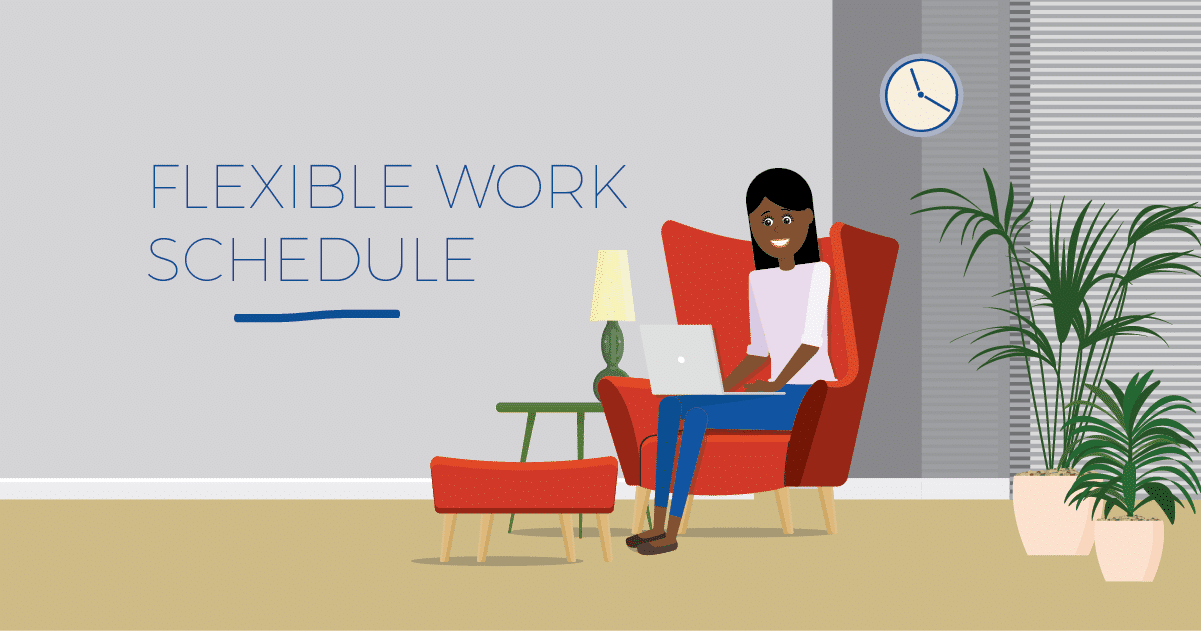There is nothing wrong with having the freedom to do your work . A flexible work schedule allows employees to work different hours from the normal company reporting times. A flexible work schedule comes in many ways; compressing work days, flexible daily hours, or telecommuting. Although the freedom to work in your time and space is exciting, the decision to work flexible hours largely depends on your ability to complete all aspects of your job.
Let’s take a look at the different sides of working freely to help you decide whether you’d want to negotiate a flexible work schedule.
Table of Contents
The Case in Different Work Environments

Before you consider negotiating for flexible working hours, you need to consider your working environment. In an exempt employee work environment, normal working hours are generally 8 a.m. – 5 p.m. or 9 a.m. – 6 p.m. making a total of 40 hours work per week including a one-hour lunch break.
In a non-exempt workplace, often industrial, production, warehousing, or customer facing such as retail, a flexible schedule depends on the amount of interdependence required in the work. A nurse who works the afternoon shift will have trouble exercising flexibility if he can’t find another employee to cover his shift.
Benefits of Flexible Work Schedules

1. Flexible Work-life Balance
If you have a flexible schedule, you can go to a parent-teacher conference during the day, take a yoga class, or take care of matters at home like repairs while attending to your work needs. With a good balance, you are sure to excel if you decide to take your work home.
2. Reduces Traffic Stress and Fuel Spend
For most people, commutes of more than an hour to work each day is very common. If you are allowed to work from home, that saves two hours of time, gas, and wear and tear on the road. Not to mention, fewer people driving means easier commuting and less traffic jam. You’d be amazed at how much faster commuting is if you have to be in the office at 10:00 a.m instead of 8:00.a.m.
3. Reduces Job Burnout
Getting a flexible work schedule means you can take a break when you need to without incurring the wrath of your boss. This helps you accomplish most of your day’s tasks, refreshes your mind regularly and will get to enjoy working without experiencing the job burnout syndrome.
4. Increased Feeling of Personal Control
You develop a sense of control to deliver and meet timelines. When giving the opportunity to have a flexible schedule, you ignite a managerial and entrepreneurial spirit in you which you can transfer to all aspects of your personal life.
5. Reduces Child Care Costs
Do you have a child? With a flexible working schedule, external childcare hours and costs of hiring a nanny may decrease. If a couple both have flexible schedules, mom can go into the office at 6:00 a.m. and dad can get the kids ready for school. Mom’s 8-hour day is finished by 2:00 p.m. and she is there to meet the bus at 3 p.m., while dad starts his workday at 9:30 a.m. The result is two full-time jobs and income with little childcare costs.
When Flexible Work Goes Wrong

If you thrive while working in an office environment more, then you may find flexible work schedule difficult when your colleagues don’t hold the same schedule while you want to work interdependently. This is why many employers require core days and hours which everyone is in the office.
Working from home can often make neighbours and friends think you aren’t actually working, thus causing problems with relationships. Friends can become upset when you say you can’t watch their child, or let the repairman into their houses because, after all, you’re home all day.
There is no clear division between work and home. Sometimes when you think flexible schedules will give you more freedom, it means working all of the time. If your boss allows you the flexibility to work from home or adjust your work time, then they won’t feel guilty about calling you at 9:30 p.m.
Many managers feel that early birds are hard workers and night owls are slackers. There’s no evidence to this because it’s simply a matter of the company culture. If you’re considering a flexible work schedule, first consider your nature of work and talk to your boss.
Do you think a flexible work schedule will work for you? Share your views with us in the comment section below.





